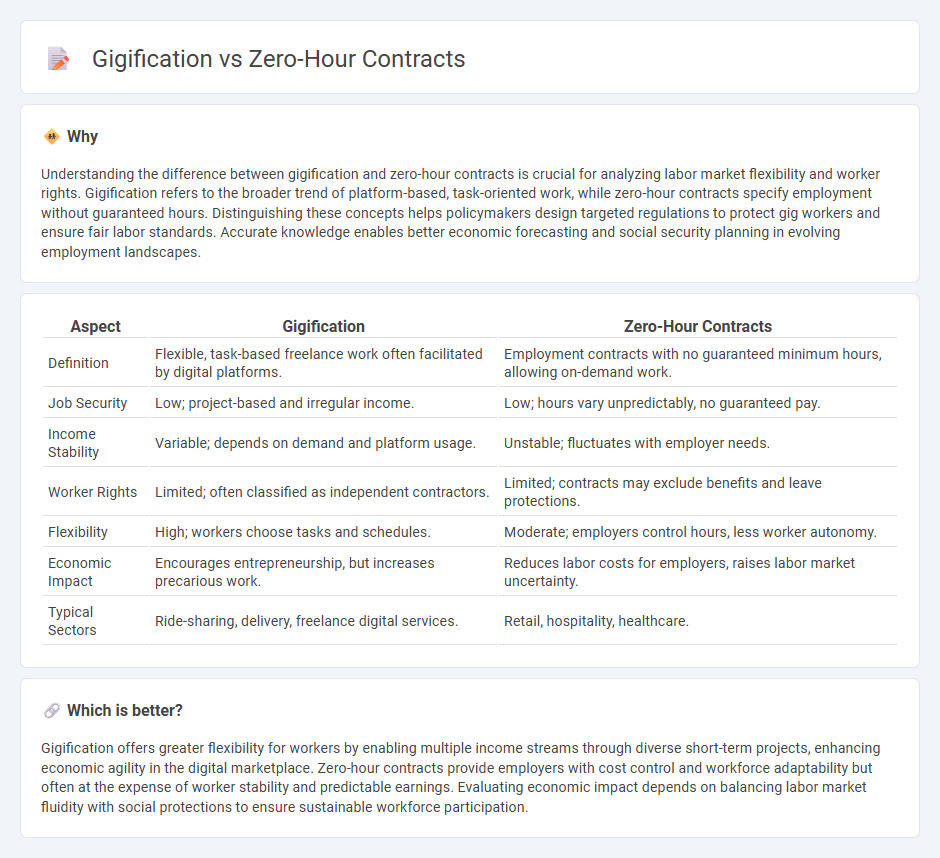
Gigification transforms traditional employment by enabling flexible, task-based work through digital platforms, promoting autonomy but often lacking job security. Zero-hour contracts bind workers without guaranteed hours, offering income variability and limited benefits, raising concerns about economic stability. Explore the impact of these employment models on modern labor markets and worker rights.
Why it is important
Understanding the difference between gigification and zero-hour contracts is crucial for analyzing labor market flexibility and worker rights. Gigification refers to the broader trend of platform-based, task-oriented work, while zero-hour contracts specify employment without guaranteed hours. Distinguishing these concepts helps policymakers design targeted regulations to protect gig workers and ensure fair labor standards. Accurate knowledge enables better economic forecasting and social security planning in evolving employment landscapes.
Comparison Table
| Aspect | Gigification | Zero-Hour Contracts |
|---|---|---|
| Definition | Flexible, task-based freelance work often facilitated by digital platforms. | Employment contracts with no guaranteed minimum hours, allowing on-demand work. |
| Job Security | Low; project-based and irregular income. | Low; hours vary unpredictably, no guaranteed pay. |
| Income Stability | Variable; depends on demand and platform usage. | Unstable; fluctuates with employer needs. |
| Worker Rights | Limited; often classified as independent contractors. | Limited; contracts may exclude benefits and leave protections. |
| Flexibility | High; workers choose tasks and schedules. | Moderate; employers control hours, less worker autonomy. |
| Economic Impact | Encourages entrepreneurship, but increases precarious work. | Reduces labor costs for employers, raises labor market uncertainty. |
| Typical Sectors | Ride-sharing, delivery, freelance digital services. | Retail, hospitality, healthcare. |
Which is better?
Gigification offers greater flexibility for workers by enabling multiple income streams through diverse short-term projects, enhancing economic agility in the digital marketplace. Zero-hour contracts provide employers with cost control and workforce adaptability but often at the expense of worker stability and predictable earnings. Evaluating economic impact depends on balancing labor market fluidity with social protections to ensure sustainable workforce participation.
Connection
Gigification and zero-hour contracts are interconnected through their shared emphasis on workforce flexibility and on-demand labor. Both models prioritize short-term, task-based employment without guaranteed hours, impacting income stability and labor rights. This connection drives changes in economic labor structures, influencing market dynamics and regulatory frameworks worldwide.
Key Terms
Employment Security
Zero-hour contracts offer flexible work hours but often lack guaranteed income and job stability, raising concerns about employee welfare. Gigification, characterized by short-term, task-based work, further blurs traditional employment boundaries, frequently resulting in limited benefits and minimal legal protections. Explore the evolving landscape of employment security to understand the implications for workers in the modern economy.
Flexibility
Zero-hour contracts provide employers with the flexibility to adjust labor hours based on immediate demand, often leaving workers without guaranteed minimum hours, while gigification emphasizes independent contractor status, enabling workers to choose tasks and work schedules autonomously. Both models prioritize scheduling adaptability but differ in worker protections and the degree of control over income streams. Explore deeper into the nuances of labor flexibility and worker rights in the evolving gig economy.
Worker Rights
Zero-hour contracts and gigification both challenge traditional employment by prioritizing flexibility over job security, often resulting in limited worker rights such as unpredictable income and lack of benefits. Workers on zero-hour contracts face irregular hours and no guaranteed minimum pay, while gig workers typically operate as independent contractors without employer-provided protections like sick leave or retirement plans. Explore comprehensive strategies to enhance worker rights and ensure fair treatment in these evolving labor models.
Source and External Links
Zero-hour contract - Wikipedia - A zero-hour contract is a UK employment agreement where the employer is not obligated to provide any minimum working hours, and the worker is not required to accept work offered.
What is a Zero-Hour Contract? - Justworks Glossary - Zero-hour contracts are employment agreements that specify a minimum (often zero) number of hours per month, offering flexibility to both employer and employee but resulting in income uncertainty for workers.
What Is a Zero Hour Contract? (Advantages and Disadvantages) - This contract type is used for workers with inconsistent schedules, allowing employers to call in staff only when needed and giving employees the option to decline shifts.
 dowidth.com
dowidth.com